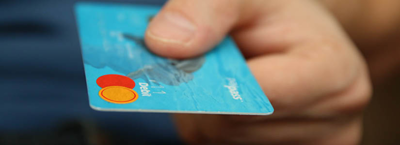
If you’ve never applied for a credit card before and don’t know where to start, you’ll find everything you need to know in this guide.
Not sure whether to take out a loan or apply for a credit card? Then check out the following article instead:
Should I get a credit card or a loan?
What is a credit card?
A credit card can be used in the same way as a debit card - except the money isn’t taken from your bank account when you buy something. Instead, at the end of the month, your provider sends you a bill for the money you borrowed.
When you receive your credit card bill, you can either:
Pay some of it, in which case the remaining balance is added to the following month’s bill - with interest rolling-up until you’ve cleared your loan; or
Pay the full amount - meaning no interest will be added to the next bill your card company issues.
How credit card payments work: pros and cons
A credit card facility could benefit you if used for the right reasons and not too frequently. But before applying, it’s important to look at the pros and cons of borrowing this way.
Credit card pros
Give your credit score a boost
Stay within your limit, consistently make your minimum monthly payments, and watch your credit rating climb. When applying for big loans in the future - for example, mortgages - lenders will view you as lower risk and feel more inclined to approve your application.
If you need a short term loan with Salad Money, we don’t use your credit rating in the initial lending decision. Instead, we assess your financial situation with Open Banking, which has no effect on your credit score.
Protection when things go wrong
Purchases costing between £100-£30,000 are covered by Section 75 of the Consumer Protection Act. This means your card provider and retailer are jointly accountable if something unexpected happens - i.e. the shop you bought from goes into administration.
Credit card cons
You could damage your credit score too
In the right hands, a credit card is a great way to prove to lenders you’re a safe bet. But if you miss payments or frequently exceed your credit limit, it will be harder to borrow in the future - as providers will consider you higher risk and either decline your application or charge a higher interest rate.
Interest can mount up & become costly
It’s okay not to pay off the entire monthly bill once in a while; but not all the time. Interest rolls-up month-to-month and can, over a period of time, become difficult (if not impossible) to repay. Avoid falling into the minimum repayment trap by having a plan in place to repay more than your monthly balance.
How to get a credit card: three things you should know
If you’ve never applied for a credit card before, here are a few useful facts to guide you.
1. Your card provider will run a credit check
To do this, they’ll review your income, any debt you carry, and other financial commitments. Every provider is different - meaning one might decline your application and another accept it.
The application you make will leave a trace on your credit file (even if your lender says yes) - so avoid making a large volume of applications within a short period of time.
2. Your card will come with a fixed credit limit
If your application is given the green light, your provider will limit your monthly expenditure. They will determine this limit using information pulled from your credit file (for example, your earnings and financial history).
Important
Your provider may increase your credit limit later if they see you as a safe bet; but you reserve the right to decline this offer. You can also ask for your limit to be reduced.
3. You must repay your minimum balance
Ideally, you should pay your monthly balance in full. That way, you can avoid paying interest. If that’s not possible, clear the minimum. Otherwise, your provider will charge you a late repayment fee and a mark will be made against your credit file.
The safest way to meet the obligations of your agreement is to set up a monthly direct debit for the minimum amount. You can then make overpayments separately.
Which credit card should I choose?
There are many types of credit card, four of which we have listed below to help guide your decision.
1. Balance transfer credit cards
Do you already have credit or store cards? Then why not transfer these debts onto a balance transfer card with an APR of 0%. You could reduce your debt faster, as you won’t be paying interest during the introductory period.
Make sure you choose a balance transfer card with the longest 0% period and one with (i) no one-off fee; or (ii) no fee at all (which is possible if you shop around).
2. Reward credit cards
If you’re good at managing your money, a reward card could be worth it. Pay your monthly balance in full month-on-month and you’ll receive cash or loyalty points as a thank you from your provider.
Reward cards only make sense if you stay within your limit. Exceed it, and the benefits you’ve earned will be rendered null and void.
3. All-rounder credit cards
Most cards are designed to reduce debt or incentivise customers to spend money. An all-rounder credit card does both and at an introductory rate of 0% percent.
A key advantage of an all-rounder card is that you need only apply for one card - reducing the number of applications you need to make while protecting your credit score.
4. 0% interest cards
This type of card charges zero interest for a set period. Although a cheaper way to borrow, it’s easy to forget when the introductory offer expires - resulting in an unexpected (and higher) monthly bill.
0% interest credit cards work best when used tactically to fund a specific purchase, like a washing machine, or new laptop. Set a reminder to cancel your card a month before your offer expires to avoid being caught out.
What is APR on a credit card?
The term APR stands for Annual Percentage Rate. It incorporates the interest rate on a credit card (or other form of loan) - and other charges, like arrangement fees.
What’s the difference between APR & interest rate?
APR tells you the overall cost of all fees (including the interest rate), so there are no hidden surprises later on. This makes it much easier to compare credit card offers and other types of loan.
How to pay off a credit card
Here are three ways you could reduce your credit card debt faster:
Pay off more than the minimum balance. To clear your credit card debt, you’ll need to pay more than the interest. Work out how much you can afford to overpay by, then factor that figure into your monthly budget.
Sell things to help reduce your overall debt. If you’re struggling to pay your minimum balance, try selling items online using sites like eBay or Facebook to raise additional funds.
Track your spending to identify trends. By logging your expenditure, you’ll be able to work out where you’re overspending and make cutbacks - so you can up your credit card repayments.
How to cancel a credit card:
Call your provider and check your balance is clear - otherwise it could hurt your credit rating.
If you’ve taken out a rewards-based card, make sure you cash in your benefits first.
When calling to confirm, consider any counter-offers before making your decision.
Back-up your cancellation request in writing and make sure you get a written confirmation from your provider.
Other considerations
Are you closing your account because you’re applying for credit elsewhere? Then don’t cancel your card until your new application is approved - as it might otherwise affect your ability to secure new credit.
Do you have more than one card? Then keep the one you’ve had the longest, as long-term credit is a great way to prove to lenders you’re low risk. Instead, you may want to cancel cards with high annual fees or limits.
Check your credit report afterward. Sometimes, credit card companies make mistakes. Check your file reflects the fact you closed your card - not your issuer - and notify your agency if there’s an error.
Salad Money: an alternative to credit card loans
Instead of applying for a credit card, you could take out one of our short-term loans. You won’t need to worry about your credit rating either - as we use a system called Open Banking.
Applying for one of our new loans doesn’t impact your credit score. We use Open Banking in our initial assessment. If successful, we report your loan to the CRA’s (Credit Reference Agencies). Your credit score won’t hold you back from being eligible.
We specialise in helping employed people who might otherwise struggle to secure credit at a fair interest rate elsewhere. Why not apply now or contact us to learn more.



